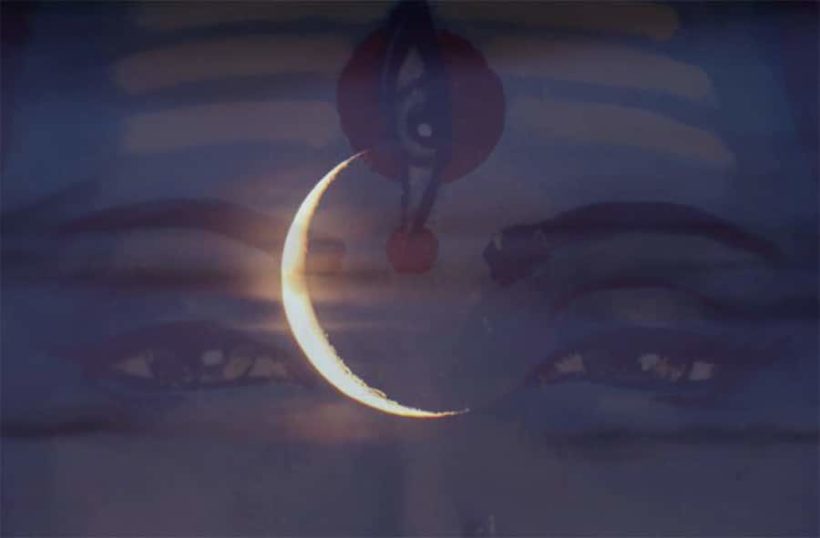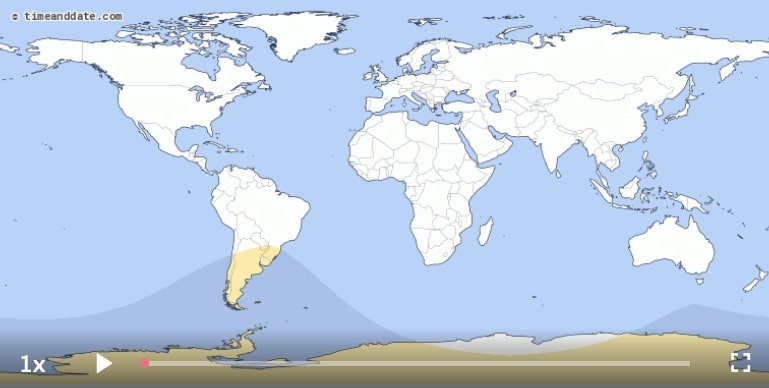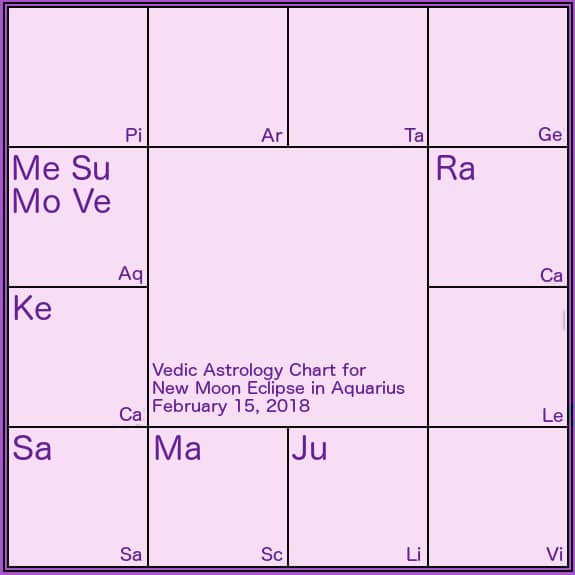The planetary energy is all focused around Aquarius right now, as Sun and Moon join both Venus and Mercury there on Wednesday night, a dark Moon night that will bring in a new lunar cycle as well as a partial solar eclipse. The three outer planets, Mars, Jupiter, and Saturn, all cast their gazes on this eclipse through their respective aspects onto Aquarius. The nodes, Rahu and Ketu, influence this New Moon via their eclipsing affect (though they are still transiting the Cancer-Capricorn axis).
The exact time of the New Moon in Aquarius will be at 1:05 pm PST, on Thursday, February 15th. The Moon and Sun will converge in Dhanishta nakshatra at this time, which is the sign of “the wealthy,” showing us our potential to thrive in life, and also associated with music and the steady beat of the cosmic drum. A partial solar eclipse occurs simultaneously, though mostly visible only from Antarctica, from 10:55 am to 2:47 pm PST (18:55 to 22:47 UT), peaking at 12:51 pm PST (20:51 UT).
Aquarius Cycle
With so much energy converging around Aquarius, this eclipse and the coming month will draw our focus towards something larger than ourselves—the greater good, and our potential to create thriving communities around us. Aquarius is ruled by the planet Saturn, who makes us think about the long-term, the bigger picture, and the commitments and hard work that are needed to take us to our goals. As the active, yang, or masculine expression of Saturn, Aquarius is where we are willing to move our efforts outwards, towards long-term goals that affect the world around us. Under an Aquarian mindset we become willing to work for social equality, planetary and even universal harmony. Community values become more important than the individual, and we find ourselves happy to become part of and of service to a greater cause.
Dhanishta
Under Dhanishta nakshatra, the Vedic constellation within Aquarius where this New Moon occurs, we strive to step into beat with the cosmic rhythm. The symbol for this nakshatra, “the wealthiest,” is the drum, often associated with the damaru (hand-drum) of Nataraj, Shiva in the form of the cosmic dancer. There is a universal rhythm that plays through, behind, and around our existence, that goes beyond our individual desire to forge our own path and dance to the beat of our own drum, as they say. When we desire to come into alignment with the cosmic rhythm, and surrender to the greater divine pulse that calls from within, we may actually find ourselves happier than when we were attempting to harness power through a more narrow vision.
Five Planets Influencing
With Venus and Mercury joining in Aquarius, our desires and intellect may also more easily align with this broader vision. Mars, Jupiter, and Saturn are also all casting their drishti (“glance,” or aspect) on Aquarius, and the Sun, Moon, Mercury and Venus. This is due to the special aspects that these planets cast according to Jyotish, different from those in Western astrology. Saturn aspects the third house from himself (and the tenth), Mars the fourth (and the eighth), and Jupiter the fifth (and the ninth). With their influence, our actions, principles, and committed nature are also all aimed at the Aquarian concepts of universal duty, connection, and service.
Eclipse
Although the nodes are aligned with Cancer and Capricorn, and this New Moon occurs in Aquarius, Ketu is close enough to the Sun and Moon now that it will cause a partial solar eclipse on Thursday. Although this eclipse may not seem as dramatic as the recent ones that were visible in their totality, it will nevertheless stir the shadow energy of the nodes, and compel us to do some work on ourselves and our lives, or else feel the disturbing effects that eclipses can bring.
With the Sun being eclipsed in Aquarius and Dhanishta, we may feel extremely cut off from our individual power, which can really highlight our human need for community support, and service. When we realize that “I” the individual is not able to solve all our problems, or that personal gain means little without friends to share it with, our place as part of a larger network begins to seem more important. You may also feel cut off from whatever in life is represented by Aquarius in your individual natal chart (or by any planets there), or may have some difficulty (urging you towards transformation) in that area of life. (Free Eclipse Forecast for those on my free mailing list).
This eclipse may show us where we have been neglecting community engagement, public service, or social networking, and if we aren’t willing to look at that, the lessons of the eclipse could be painful. Whether this is a new realization, or even if social involvement is already a large part of your life, this eclipse could be revelatory and transformational, showing you (and your friends) some innovative ways to take your community vision to the next level.
Maha Shivaratri
Tuesday night, the night before the Dark Moon night, is a prime time to dig deep and lay the groundwork for some deep insights and personal growth following Thursday’s eclipse. Tuesday brings Maha Shivaratri, the “great night of Lord Shiva,” in Hindu tradition. It falls on the 14th phase of the waning Moon this month (check here for your local time), and is perhaps the most auspicious night of the year for doing sadhana (spiritual practice). It is traditional on this night to stay up all night fasting, chanting, praying, and meditating.
This holiday honors Lord Shiva, the great ascetic, and particularly two stories of great sacrifices that were made protect the entire creation. One of these comes from the story of the churning of the milk ocean, which the gods and demons were doing in order to release the nectar of immortality. Before the nectar came up, however, a poison came up first. (This is similar to when we do spiritual practice and begin our path of self-inquiry, and negative tendencies often come to light first, which can be a painful experience. Similarly, during a physical fast or cleanse, toxins can be shaken loose and released first, causing a healing crisis before we continue healing into a freer, happier state of being.) When the poison came up from the milk ocean, Lord Shiva consumed it so that it would not engulf humanity, the first story of great sacrifice. His wife, Parvati, held his throat however, so that he could not ingest it, thus saving him in turn.
 Maha Shivaratri also commemorates the wedding of Shiva and Parvati, which also stemmed from great sacrifice made for the benefit of all humanity. It was said that after his first wife, Sati, perished, Shiva was fully devoted only to his sadhana, meditating for aeons in isolation and renouncing the world. Then the demon Tarakasura began running amock on earth, threatening all of humanity. Brahma fortold that only Shiva’s child could defeat Tarakasura, so the gods devised a plan for Sati to reincarnate as Parvati, and win over her Lord to marriage once again. He was not easily swayed, however, and it was only after Parvati became an ascetic and underwent great penance that he agreed to marry.
Maha Shivaratri also commemorates the wedding of Shiva and Parvati, which also stemmed from great sacrifice made for the benefit of all humanity. It was said that after his first wife, Sati, perished, Shiva was fully devoted only to his sadhana, meditating for aeons in isolation and renouncing the world. Then the demon Tarakasura began running amock on earth, threatening all of humanity. Brahma fortold that only Shiva’s child could defeat Tarakasura, so the gods devised a plan for Sati to reincarnate as Parvati, and win over her Lord to marriage once again. He was not easily swayed, however, and it was only after Parvati became an ascetic and underwent great penance that he agreed to marry.
Thus, this holiday is celebrated through the penance of fasting, forgoing food, water, and sleep, for one night, and simultaneously celebrating the union of Lord Shiva and Parvati, or the masculine and feminine energies of creation, that allows this dance of life to continue. It is an apt time to feel the forces of Aquarius upon us, which compel us to consider our role in society, and in the universe, and what personal sacrifices we can make for the greater good. Even if you’re not able to stay up the whole night, any amount of devotional practice, serviceful sacrifice, or chanting of Om Namah Shivaya on this night can have beneficial affects that are magnified greater than on any other night.
Personal readings and Eclipse readings available here.



